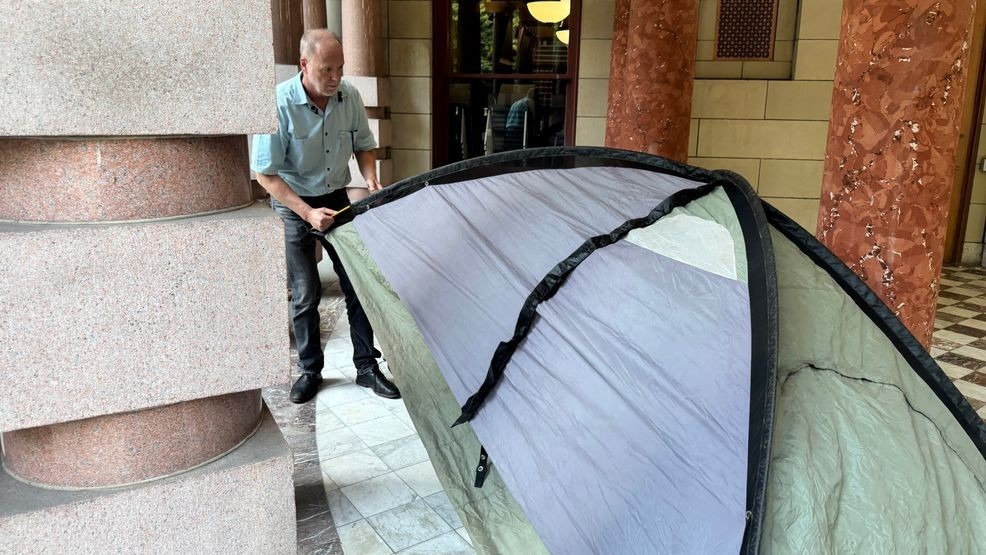PORTLAND – A Portland property owner’s unusual protest against a new homeless shelter landed him in handcuffs, drawing attention to the city’s mounting tensions over homelessness policy.
Business Owner’s Protest
On Tuesday, 64-year-old Paul Rudinsky, who owns the Oro Apartments in the Pearl District, set up a tent just steps away from City Hall. His intent was symbolic: to show city leaders how close his own building will soon be to a newly approved “low barrier” homeless shelter on Northwest Northrup Street.
Within hours, police officers arrived and arrested Rudinsky for trespassing. “If I’m about to have tents 15 yards from my property every night, then City Hall should see what that looks like outside their own doors,” he explained before being taken into custody.
Also Read
Concerns Over Low Barrier Shelters
The new shelter, scheduled to open next week, will provide overnight beds from 8 p.m. to 6 a.m. using a reservation system. City officials argue this will reduce loitering and offer stability by allowing guests to keep their beds from one night to the next.
But Rudinsky and other nearby business owners see it differently. Because the shelter does not require sobriety or employment, critics believe it could invite disorder and further strain a neighborhood already struggling with open drug use and crime.
“This isn’t compassion, it’s chaos,” Rudinsky said. “Businesses and residents are left to pay the price.”
City Hall Defends the Plan
Portland Mayor Keith Wilson has defended the shelter, calling it a necessary step in addressing the city’s worsening homelessness crisis. “Homelessness is already widespread in the Pearl District,” Wilson said. “This project will meet needs and exceed expectations.”
City officials stress that the shelter is not a cure-all but a temporary solution to provide safe space for those currently sleeping on sidewalks, in parks, and near storefronts.
A Divided City
The arrest has struck a nerve among Portlanders. To many, the optics are troubling: a business owner staging a symbolic protest is swiftly removed by police, while sprawling homeless camps and open-air drug markets continue to grow across the city with little enforcement.
“It feels backwards,” one resident said. “Critics of city policy are punished, but the actual problems go untouched.”
The tension reflects broader frustrations over Portland’s “housing first” model, which prioritizes getting people into shelters or housing with minimal requirements. Advocates believe it’s the most humane and effective strategy, but opponents argue it enables addiction and does little to address crime.
Lessons From Other Cities
Critics often point to Seattle, San Francisco, and Los Angeles as cautionary tales. All three cities have invested heavily in low barrier shelters and housing first initiatives, yet continue to grapple with entrenched homelessness, public safety issues, and skyrocketing costs.
Portland’s detractors fear the city is headed down the same path. “We’ve seen this movie before, and it doesn’t end well,” Rudinsky warned.
Shelter or Stalemate?
The Pearl District’s new shelter is designed to provide overnight relief, but some fear it will only add to daytime loitering. With beds unavailable between 6 a.m. and 8 p.m., residents expect large groups to remain nearby with nowhere else to go.
The city insists that outreach workers and reservation policies will help manage the flow of guests. Still, trust between officials, business owners, and residents is fraying.
A Flashpoint in Policy Debate
Rudinsky’s arrest has quickly become a flashpoint in Portland’s homelessness debate. For supporters of low barrier shelters, it highlights the urgency of expanding services for vulnerable populations. For opponents, it illustrates government’s misplaced priorities—acting swiftly against dissent while struggling to enforce basic laws on the streets.
As the shelter prepares to open, Portland faces a pivotal question: Should the city double down on low barrier, housing-first programs, or reexamine a strategy that many say is already failing?
For now, one man’s tent at City Hall has put the spotlight squarely on that choice.












